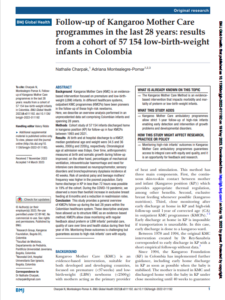
Background Kangaroo Mother Care (KMC) is an evidence-based intervention focused on premature and low-birth-weight (LBW) infants. In different healthcare systems, outpatient KMC programmes (KMCPs) have been pioneers in the follow-up of these high-risk newborns. Here, we describe an overview analysis performed in an unprecedented data set comprising Colombian infants and spanning 28 years.
Methods Cohort study of 57 154 infants discharged home in kangaroo position (KP) for follow-up in four KMCPs between 1993 and 2021.
Results At birth and at hospital discharge to a KMCP, median gestational age and weight were 34.5 and 36 weeks, 2000 g and 2200 g, respectively. Chronological age at admission was 8 days. Over time, anthropometric measures at birth and somatic growth during follow-up improved; on the other hand, percentages of mechanical ventilation, intraventricular haemorrhage and need for intensive care decreased as neuropsychomotor, sensory disorders and bronchopulmonary dysplasia incidence at 40 weeks. Risk of cerebral palsy and teenage mothers’ frequency was higher in the poorest population. Early home discharge in KP in less than 72 hours was possible in 19% of the cohort. During the COVID-19 pandemic, we observed a more than twofold increase in exclusive breast feeding at 6 months and a reduction in readmission rates.
Conclusion This study provides a general overview of KMCPs follow-up during the last 28 years within the Colombian healthcare system. These descriptive analyses have allowed us to structure KMC as an evidence-based method. KMCPs allow close monitoring with regular feedback about preterm or LBW infants’ perinatal care, quality of care over time and health status during their first year of life. Monitoring these outcomes is challenging but guarantees access to high-risk infants’ care with equity.